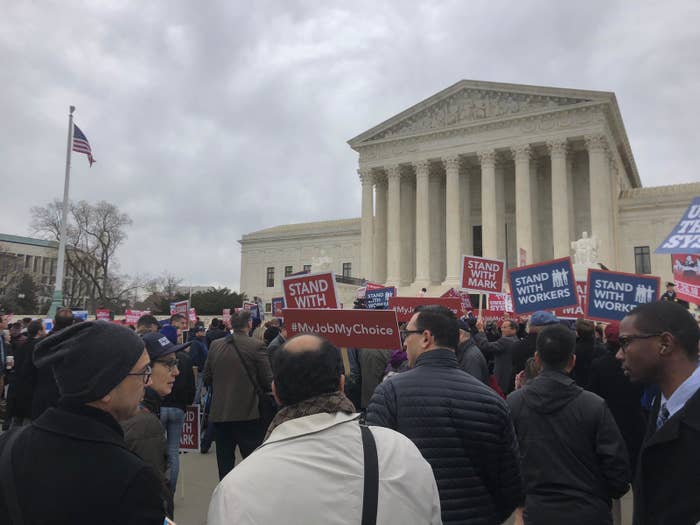
The Supreme Court on Monday morning heard arguments — again — over the question of whether it is a violation of the First Amendment when public sector unions require nonunion members to pay "agency fees."
Despite the spirited arguments — which included Justice Anthony Kennedy railing against public sector unions and Justice Sonia Sotomayor calling out the Justice Department for switching positions in multiple cases — the key justice in the case, Justice Neil Gorsuch, said nothing.
In January 2016, the justices heard arguments on the issue — with the court appearing to be headed to a 5–4 ruling against the unions. Then, Justice Antonin Scalia died and the court split 4–4 — a ruling that meant agency fees would still be allowed in the public sector for the time.
When Donald Trump won the election, however, conservatives who had been backing the effort to roll back public sector unions' influence prepared to bring the question back to the high court once a new justice was confirmed.
The Supreme Court granted the case — brought by Mark Janus against the American Federation of State, County, and Municipal Employees, Council 31, in Illinois — in late September, once Gorsuch had joined the court, and heard arguments on Monday.
Although Gorsuch was at the arguments, he and Justice Clarence Thomas — who generally asks no questions at oral argument — were the only two silent justices for the hourlong arguments that had four different lawyers making their case for or against the agency fees.
Janus's lawyer, William Messenger, began the arguments directly, stating that the court should overrule the 1977 case, Abood v. Detroit Board of Education, that allows public sector unions to require nonunion members to pay a fee for the services provided to all employees regarding contract negotiations and administration.
"Abood should be overruled because it failed to apply heightened First Amendment scrutiny to a compulsory fee for speech to influence governmental policies," Messenger said — a succinct statement of the position to end agency fees in public sector unions.
When Solicitor General Noel Francisco took to the podium, he, like Messenger, got questions from the more liberal justices about "reliance interests" — the fact that the 1977 decision has been built into state laws in about half of the country and in public sector union contracts across the nation — and whether there is a principled difference between an individual seeking employment negotiations, which has been held to have no First Amendment protection, and union negotiations, which Janus and the Justice Department argue raise First Amendment issues.
As Francisco's time wound down, however, Sotomayor pointedly asked: "Mr. General, by the way, how many times this term already have you flipped positions from prior administrations?
After saying that they had done so in three cases, Justice Stephen Breyer asked a question to turn the discussion back to the specifics of the Janus case.
When the state of Illinois and the union's lawyers made their arguments, the more conservative justices took the lead — with Kennedy vigorously and repeatedly taking aim at the fees and the public sector unions' aims more broadly.
Calling agency fees "compelled subsidization of a private party" in the first question to Illinois Solicitor General David Franklin, Kennedy went on refer to the union as "a private party that expresses political views constantly."
Later, when Franklin referred to the state's interest in having a "stable, responsible ... partner" in contract negotiations, Kennedy scoffed. "It can be a partner with you in advocating for a greater size workforce, against privatization, against merit promotion, ... for teacher tenure, for higher wages, for massive government, for increasing bonded indebtedness, for increasing taxes?" he said. "That's ... the interest the state has?"
Despite the strong views expressed on both sides — and despite the expectation going into Monday's arguments that the conservatives likely would be reaching the 5–4 decision that had been expected in 2016 — Gorsuch's silence on Monday left some question about where the court will end up.
In particular, Justice Stephen Breyer appeared to be seeking a compromise path — offered up by Illinois — that would allow a more limited and "very firm line," as Franklin put it, on what types of expenses could be assessed against nonmembers through union fees.
The court sets no timeline for when it will issue its decisions, but a decision is expected by the end of June.

